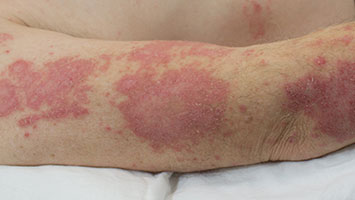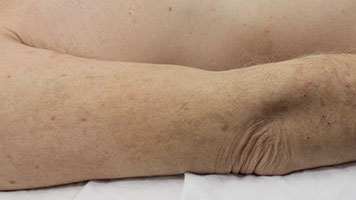Psoriasis
Psoriasis is a chronic inflammatory disorder of the skin which manifests as well defined patches of red, dry and scaly skin and is one of the most common autoimmune diseases.
The most common age to develop psoriasis is between 15–25 years and then again between 50–60 years. It is seen in males and females equally. Psoriasis has a strong genetic relationship, with 8% of people developing psoriasis when one parent is affected and around 41% when both parents have it.
The most common triggers for psoriasis include physical trauma, infection (especially from strep throat), stress (as high as 40% of adults and even higher in children), excessive alcohol intake and pharmaceutical drugs (lithium, internal corticosteroids, beta blockers, and antimalarials being the most common).
Chinese medicine has descriptions of psoriasis-like disorders all the way back to at least 600 CE and has developed very effective herbal treatments for psoriasis.
Symptoms
Inflammation causes skin cells to reproduce too quickly– every 3 to 5 days rather than the typical 28 day cycles of normal healthy cells. These new skin cells lack integrity and so slough off quickly, leading to the thick scaling often seen with psoriasis. The more aggressive the inflammation, the more profuse the scaling may be.
Psoriasis manifests in a symmetrical way, meaning if it is on one arm, it will most likely be on the other arm as well. It may stay confined to just a few spots, like the elbows, knees, and scalp, or may pop up anywhere, and everywhere, covering the entire body. The lesions may be quite flat and superficial on the skin, or be thick and hard, almost like a piece of leather.
Psoriasis may also affect the nails, causing pitting, oil spots, and deformity. Roughly 60 to 70% of people with psoriatic arthritis also have psoriasis affecting their nails.
Some people with psoriasis experience a burning pain, especially when the lesions are quite active. If on the soles of the feet, large cracks and fissures may make walking impossible. Likewise, when on the hands, the simplest of chores can become torturous.
Many people with psoriasis will have some degree of itching, but there is a large percentage that doesn’t itch at all. This differs from eczema, which will generally always be itchy.
There are several subtypes of psoriasis, with the two most common being guttate and plaque psoriasis.
Guttate Psoriasis
Guttate psoriasis is often initiated by a strep-throat infection. This type of psoriasis manifests as small well-defined red circular tear-drop shaped patches, with an easy to scratch off scale. It is often widespread, covering much of the body, and occurs rapidly, often a few days after catching a streptococcal infection of the throat. Many cases of guttate psoriasis clear on their own after a few months duration, although many may develop into the more chronic type of plaque psoriasis.
Plaque Psoriasis
Plaque psoriasis is the most common variant people suffer with. It manifests as islands of elevated well defined hardened ‘plaques’, ranging from the size of a coin to the size of entire limbs. The colour ranges from light pinkish-red to a dark purplish-red colour and the scale on top may be silvery-white or a brownish-yellow.
Treatment
The primary treatment for psoriasis is to work from the inside-out, using individually prescribed herbal medicines which help clear inflammation, promote blood circulation and nourish the skin. Topical herbal ointments can also help speed up the process of flattening the psoriatic plaques and removing scaling.
Success
What can a patient expect from treatment?
After the first 2 to 6 weeks of herbal treatment you can expect lessening of the scaling, decreased itching, and fewer new spots. A typical full course of treatment averages around 5 to 8 months duration, or even longer for more sever types. Once the skin seems stable, you are weened off the medicine
About 65% of patients may see their psoriasis clear completely using herbal medicines, with long term stability being seen in many (based on the work of Zhu Ren Kang, one of China’s most prominent dermatologists).

before

after
